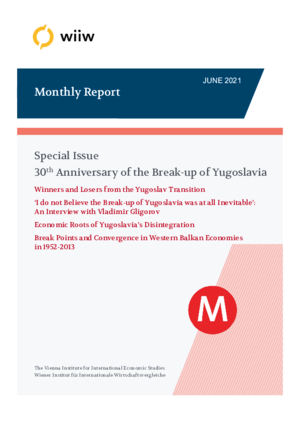Monthly Report No. 6/2021
Ivo Bićanić, Vladimir Gligorov, Veronika Janyrova, Branimir Jovanović and Milica Uvalic
wiiw Monthly Report No. 6, June 2021
55 pages including 1 Table and 30 Figures
Special Issue
30th Anniversary of the Break-up of Yugoslavia
- Chart of the month: Winners and losers from the Yugoslav transition
by Branimir Jovanović
- ‘I do not believe the break-up of Yugoslavia was at all inevitable’: An interview with Vladimir Gligorov
by Vladimir Gligorov and Veronika Janyrova
Yugoslavia could have been saved if the elites in place at the time had not resisted democratic change and had not turned to separatism. EU integration of the Western Balkans has generally been a disappointment. A way forward would require, above all, an intensification of the accession negotiations with Montenegro and North Macedonia; that would send a powerful, positive signal to the rest of the region.
- Economic roots of Yugoslavia’s disintegration
by Milica Uvalic
Pronounced regional economic disparities, which widened during the 45 years of the country’s existence, the decentralisation of economic policies introduced under the 1974 Constitution, and the severe economic crisis of the 1980s all contributed to the break-up of Yugoslavia. Nevertheless, had it not been for the progressive worsening of the political crisis, these economic factors alone would not necessarily have led to the disintegration.
- Break points and convergence in Western Balkan economies in 1952-2013
by Ivo Bićanić
None of Yugoslavia’s successor states, either while they were part of Yugoslavia or as independent states, have ever had episodes of sufficiently high growth that were long enough for them to experience ‘modern economic growth’. Their growth performance was particularly disappointing after the 1980 debt crisis, which marked a major break point in their long-term growth paths. Yugoslavia was not a ‘convergence machine’: only after independence was there a degree of convergence of the successor states’ growth paths.
- Monthly and quarterly statistics for Central, East and Southeast Europe
Reference to wiiw databases: wiiw Annual Database, wiiw Monthly Database, wiiw FDI Database
Keywords: income distribution, Yugoslavia’s disintegration, EU integration, nationalism, separatism, regional disparities, decentralisation of economic policies, debt crisis of 1980, modern economic growth, debt crisis of 1980, convergence, break points in long-term growth
Countries covered: Western Balkans, successor states of former Yugoslavia
Research Areas: Macroeconomic Analysis and Policy, Labour, Migration and Income Distribution
